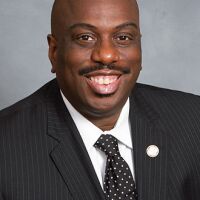The Charlotte City Council voted Monday night to restore criminal penalties for public urination, sleeping on park benches and panhandling from the median of a road.
They were among six city ordinances previously decriminalized by a 2021 state law that will now again become arrestable offenses.
Many speakers at Monday night’s meeting urged the council to reject the motion, among them criminal defense attorney Tim Emry.
"It’s not a crime to sleep outside when you have no shelter. It’s not a crime to ask someone for money. It’s not even a crime to urinate when we have no public restrooms," he said.
But those who supported the motion said bad behavior in uptown — not just among people experiencing homelessness — was getting out of hand.
"What we’re really talking about is basic civil behavior, and basic civil behavior that can be enforced," said one woman who identified herself as a resident of uptown's Fourth Ward neighborhood.
In the end, the motion passed 7-3 with Democrats split. Council member Malcolm Graham was among the five Democrats who supported the motion. He spoke with WFAE's Nick de la Canal on Tuesday.

Nick de la Canal: Please correct me if I'm wrong, but I believe the conversation around recriminalizing these offenses started with residents in the Fourth Ward neighborhood of uptown. That's in your district. What have residents there been saying?
Malcolm Graham: Yes, thank you for the question. The residents of Fourth Ward approached me about a year ago in reference to behavior issues in uptown Charlotte. There were aggressive panhandling, public urination, public masturbation, lingering out in the parks in uptown Charlotte.
Not only were they concerned, but individuals from the small business community in uptown Charlotte — those who own hotels, their guests — were concerned about some of the behavior or some of the things that they were seeing. And this goes into the consideration of all the other public safety concerns that were occurring in uptown.
De la Canal: And we've heard those complaints from Fourth Ward about public defecation and drug use, but this vote last night went a step further than that. It also recriminalizes sleeping on public park benches and panhandling from the median of a road. Why was that included in the vote and something you chose to support?
Graham: Well, again, what we needed was a comprehensive response to some of the public safety issues that we were — that are — occurring in uptown Charlotte. And so you're right, it goes beyond just the public urination. But a wide variety of quality-of-life issues that were impacting people's perception of uptown Charlotte.
De la Canal: I want to play a clip from a man who spoke at last night's meeting. He said his name was James Lee, and he used to be homeless in uptown, and that finding a bathroom as a homeless person was a challenge and that the city council isn't helping. This is what he had to say:
James Lee: 'You're tearing down two of the places that I went. I went to the public library, and I went to the transit (center). Public library gone. Transit is gonna go. Where I'm gonna go after that?'
De la Canal: So what of that? The old public library is gone while the city builds a new one, and the city is thinking about tearing down and replacing the transit center at some point.
Graham: Yeah, the — he has a legitimate point. The city council yesterday installed two Porta-Johns in uptown Charlotte. They're on 6th Street and then College Street. There's a private initiative to identify four more between the city and the county, and we're working to have a comprehensive type of response to public facilities in uptown Charlotte. We hear his concerns, and we're working really, really hard to address them.
De la Canal: Some advocates say they're also concerned that if a homeless person is charged with one of these violations, that can make it harder for them to get into an apartment later on, and that it could lead to more violent encounters with police possibly. Is that a concern you share?
Graham: CMPD has a lot of discretion at their disposal to use when they approach someone who's experiencing homelessness, and so the first step is not an arrest. It can be referring to services. It can be a warning, and so it's not going straight from 'I see someone sleeping on a bench' to an arrest, right? That's the last resort.
And so we hope that our police officers will use their discretion to handle every situation case by case and only (in) the most egregious offenses that individuals will be arrested.
De la Canal: And to the point that if a homeless person is charged or arrested, that can make it harder for them to get into housing later on?
Graham: Yes, but part of what I think we ought to do — and that we're responsible for — is securing the public safety for those in uptown. We have to police and protect the center of the region. And, again, it's not just focusing on those who are homeless, but a wide variety of bad actors.
De la Canal: These changes will take effect on March 1. That's in about two and a half weeks. What do you hope happens between now and then?
Graham: Well, that we continue to do the work that is necessary to provide the resources and services to members of our homeless community. There are a wide variety of organizations that's doing really, really good work, and we think that work should continue within the next two weeks, and continue ongoing. So the work continues.


